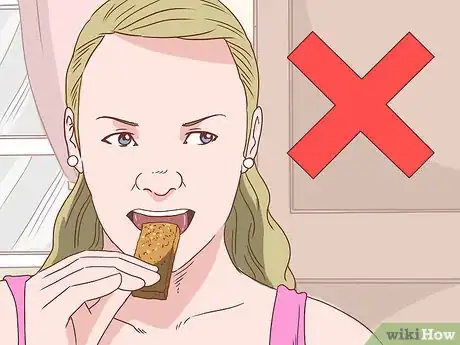This article was co-authored by Alyssa Chang. Alyssa Chang is a nutrition coach and trainer, based in the San Francisco Bay Area. She uses her extensive background in brain-based neuroscience to work with clients on improving their connections with their brain and body to heal, reach goals, and move pain-free. She holds a BS in Kinesiology and Exercise, Nutrition and Wellness from the California State University, East Bay and is certified in Precision Nutrition, Z-health Performance and is certified by the National Council for Strength and Fitness.
There are 7 references cited in this article, which can be found at the bottom of the page.
This article has been viewed 638,131 times.
Everyone knows that breakfast is the most important meal of the day, but it's also the easiest to skip. However, having a good breakfast is shown to make you more alert throughout the day and may keep you from snacking your way to lunch. Try changing up your routine or making your breakfast options a little more palatable, and you can become a breakfast person in no time.
Steps
Changing Your Routine
-
1Avoid eating anything in the 2 to 3 hours before you go to sleep. It'll be harder for you to feel hungry first thing in the morning if you're not finishing your dinner until just before you go to sleep. Aim to have your dinner finished 2 or 3 hours before bedtime, and avoid snacking after dinner to help build your appetite for breakfast.[1]
- If you feel yourself getting hungry before bedtime, try drinking a glass of water first, or only snacking on something small. Opt for a few apple slices, some cheese cubes, or a banana rather than something more substantial.
- Some studies have found that eating less at nighttime and more during the day can help with weight loss and general health.
-
2Get 7 to 9 hours of sleep each night. If you wake up in the middle of a sleep cycle or have to drag yourself out of bed in the morning, you might not have the time or the desire to eat a good breakfast. Make sure that you are getting at least 7 hours of sleep each night, and that you leave yourself time to eat breakfast the next morning.[2]
- Try going to bed a little earlier than you usually would, so that you can wake up a little earlier as well.
Advertisement -
3Wake up earlier so you have plenty of time for breakfast. If you have to rush out the door in the morning to avoid being late, it's easy to make it an excuse for skipping breakfast. If you want to start eating breakfast first thing, set your alarm around 20 minutes earlier than you usually would to make sure you'll have plenty of time to eat.[3]
- Put your alarm out of arm's reach, so you have to wake up and get out of bed to turn it off or hit the snooze button.
-
4Exercise for 30 minutes to 1 hour before breakfast. If you're not feeling hungry when you first wake up, doing a little exercise is a great way to build up your appetite. Try going for a run, or even just doing some push-ups or sit-ups first thing in the morning before you sit down for breakfast.[4]
- It may help to drink a glass of juice or have something small like a banana before your morning workout. See what feels best for you and go with that.
Choosing a Good Breakfast
-
1Mix up your breakfast options. If you're eating the same thing for breakfast every day, it can be easy to get bored with your options and choose to skip it altogether. Try planning ahead when shopping so you can vary your breakfast options based on what you're in the mood for. Here are a few simple suggestions:
- Try and get multiple types of cereal, or different toppings for your cereal or muesli for some easy variation.
- Stock up on eggs and choose one of the many ways to prepare them.
- Get something more interesting than white bread to replace your morning carbohydrates. Try scones, crumpets, bagels, French toast waffles or homemade biscuits.
- Purchase some frozen breakfast foods, such as some pastries or breakfast pizzas, for something special you can cook up quickly.
-
2Try a liquid breakfast at first. Eating a big meal first thing in the morning might take some time to adjust to, either in terms of appetite or time. Instead, try making a fruit smoothie, or even drinking a glass of juice first thing in the morning. This will help get you in the habit of eating early, and may even kickstart your appetite and make you want to eat something else.[5]
- Use whatever fruits and liquids you want when making your smoothie. Part of the fun is customizing it to whatever you're in the mood for!
- Keep some frozen fruit or berries in the fridge that you can throw into a smoothie without having to cut up or prepare. This will speed up the smoothie-making process, and the cold may help wake you up!
-
3Pick something you can prepare in advance. If you're not eating breakfast because you run out of time in the mornings, try planning ahead the night before so you have less to organize. Make some breakfast muffins or prepare some overnight oats to reduce the amount of work you have to do in the morning. [6]
- There are plenty of different healthy breakfasts that you can prepare in advance. See what else you can find or come up with.
-
4Keep some breakfast options that you can eat on the go. For mornings that you're in more of a rush than usual, it can help to keep some granola bars, bananas, or something similar that you can eat on your way out the door. This will stop from you skipping breakfast on even the most stressful mornings, and make it an easy habit to keep.[7]
- Trail mix and fresh or dried fruit are also great options for a quick breakfast.
-
5Have leftovers or other non-breakfast foods for breakfast. There's nothing to say you have to eat cereal, toast, or other breakfast foods for breakfast. If you're not in the mood for a bowl of oatmeal, dig into some leftovers from the previous night, or anything else that's in your fridge.[8]
- As long as your breakfast has some protein and ideally some carbohydrates, it should set you up for the day or at least get you to lunchtime.
-
6Spread your breakfast over the morning. While starting the day with a big breakfast is great for manual laborers and farmers, but you might not use up all that energy as quickly if you're sitting in an office. Instead of one big breakfast, spread a few breakfast snacks over the course of your morning. This will prevent you from skipping breakfast without needing to have a big appetite as soon as you wake up.[9]
- Try eating a small bowl of cereal when you first get up, a banana on the way to work, and a granola bar or some nuts after an hour or so. Mix it up and see what works best for you.
Expert Q&A
Did you know you can get expert answers for this article?
Unlock expert answers by supporting wikiHow
-
QuestionWhy does eating in the morning make me tired?
 Alyssa ChangAlyssa Chang is a nutrition coach and trainer, based in the San Francisco Bay Area. She uses her extensive background in brain-based neuroscience to work with clients on improving their connections with their brain and body to heal, reach goals, and move pain-free. She holds a BS in Kinesiology and Exercise, Nutrition and Wellness from the California State University, East Bay and is certified in Precision Nutrition, Z-health Performance and is certified by the National Council for Strength and Fitness.
Alyssa ChangAlyssa Chang is a nutrition coach and trainer, based in the San Francisco Bay Area. She uses her extensive background in brain-based neuroscience to work with clients on improving their connections with their brain and body to heal, reach goals, and move pain-free. She holds a BS in Kinesiology and Exercise, Nutrition and Wellness from the California State University, East Bay and is certified in Precision Nutrition, Z-health Performance and is certified by the National Council for Strength and Fitness.
Wellness Coach & Personal Trainer
Warnings
- If you are always very weak in the mornings or always wake up with a headache or nausea, then you should see your doctor to discuss other health problems.⧼thumbs_response⧽
References
- ↑ https://www.livescience.com/45990-morning-meals-cut-evening-food-binges.html
- ↑ https://www.theguardian.com/science/2018/oct/08/sleep-how-much-do-we-really-need
- ↑ https://theblueroom.bupa.com.au/healthier/healthy-eating/should-i-force-myself-to-eat-breakfast
- ↑ https://www.besthealthmag.ca/best-eats/healthy-eating/4-breakfast-excuses-and-how-to-beat-them/
- ↑ https://www.besthealthmag.ca/best-eats/healthy-eating/4-breakfast-excuses-and-how-to-beat-them/
- ↑ https://www.businessinsider.com/how-to-find-time-to-eat-breakfast-2017-2?IR=T
- ↑ https://kidshealth.org/en/parents/breakfast.html
- ↑ https://www.eatright.org/food/planning-and-prep/snack-and-meal-ideas/6-tips-for-better-breakfasts
- ↑ https://www.eatright.org/food/planning-and-prep/snack-and-meal-ideas/6-tips-for-better-breakfasts
About This Article
You may find it hard to feel like eating breakfast first thing in the morning, but there are things you can do to help! Try to avoid eating anything for about 2-3 hours before you go to bed each night so you’ll be more hungry when you wake up. Set your alarm a little earlier than normal to give yourself plenty of time to eat, and do about 30 minutes of light exercise, like push-ups or sit-ups, to work up an appetite. Over time, this should help your body get used to eating in the mornings. Read on to see how to plan a breakfast you’ll actually look forward to!




























































